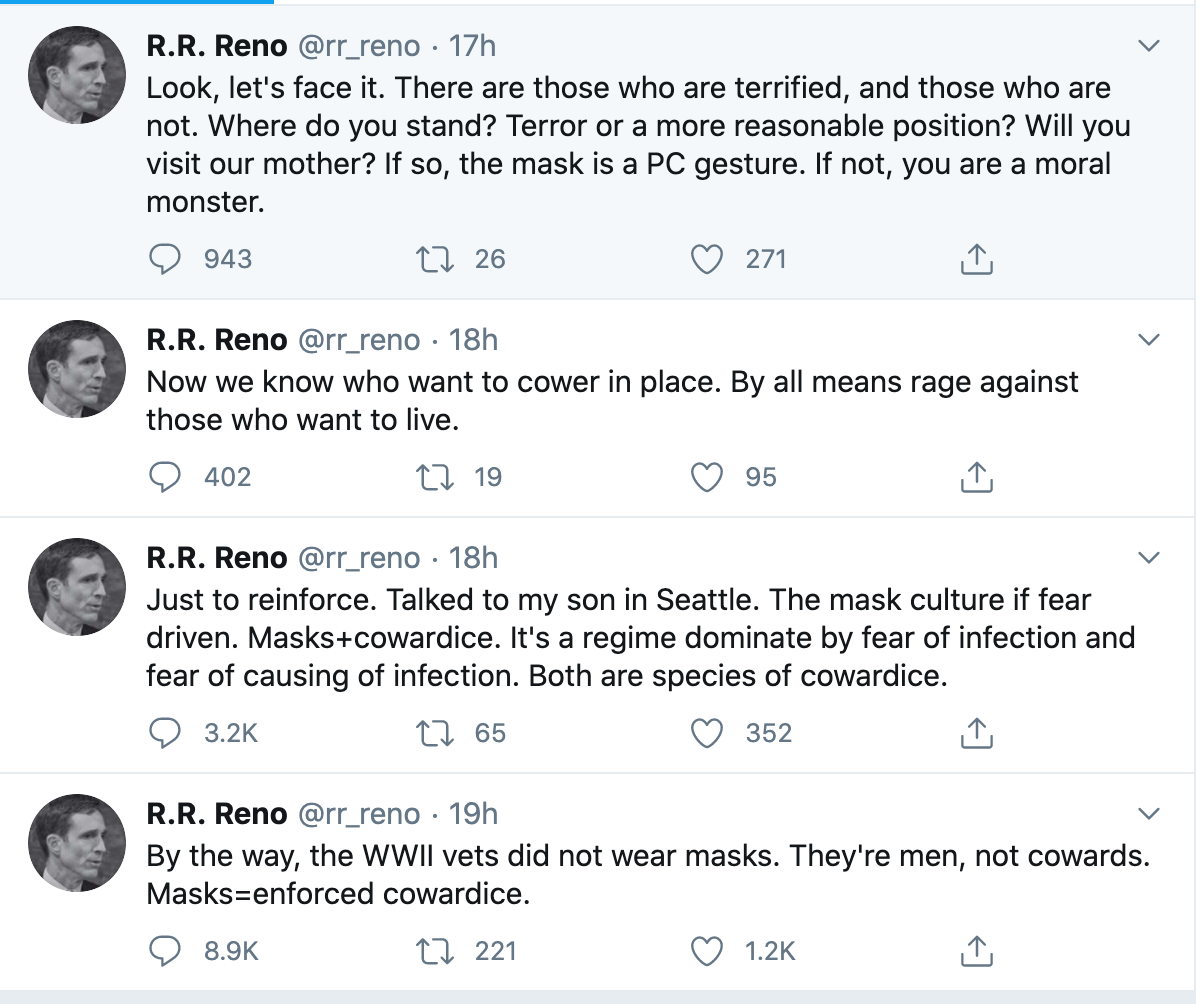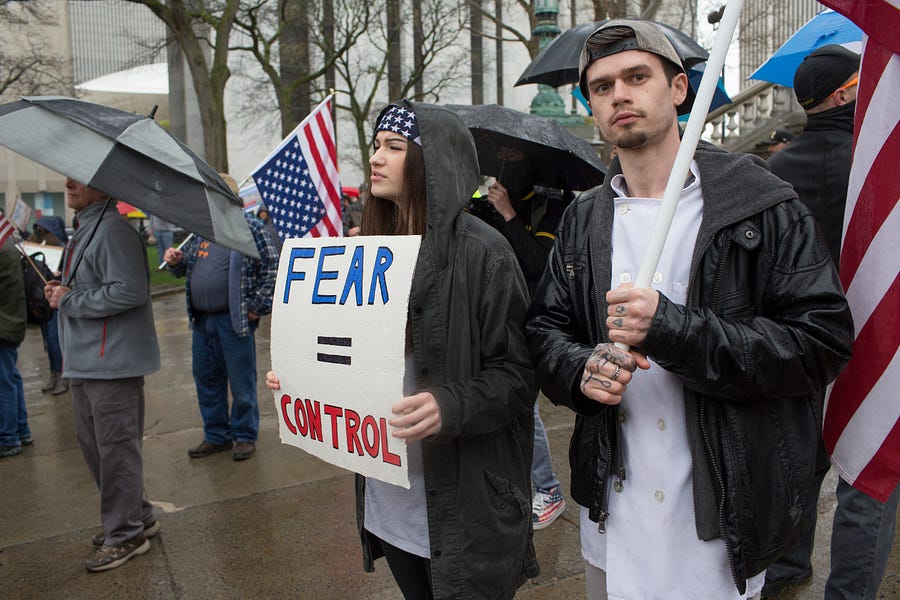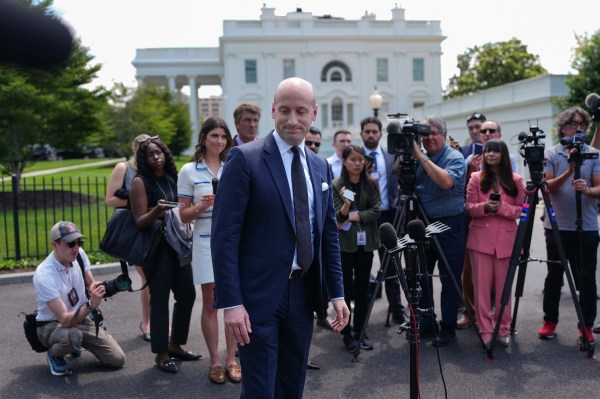Hi there,
I think making face masks into a cultural flashpoint is ridiculous. Yes, I agree that people can be too extreme on either side of the issue, and said as much in a recent column. I think the right-wing effort to turn them into a symbol of fear and tyranny and the left-wing effort to make them a badge of social solidarity are both oftentimes way too dramatic. Masks are a tool—necessary in some situations, unnecessary in others—and reasonable people can disagree about where to draw the line.
But mask-wearing is ultimately going to be part of our effort to reopen the economy. Think of it this way: If all the governors lifted their stay-at-home and business closure orders tomorrow, but said that people should wear masks to work, including on public transportation, that would be a movement in the right direction for the people desperate to “reopen” the economy. More people would show up to work. More customers would feel comfortable shopping and getting on the bus. And if governors didn’t tell people to wear masks, many would still do it, and that would still be good and helpful.
Remember, the point of wearing masks is primarily to protect others from infection, not the mask-wearer. Because people with COVID-19 can feel healthy and be asymptomatic, they can unwittingly spread the bug. Masks are not a foolproof means of preventing that, but there’s solid evidence that they can help, which is why the CDC recommends them.
This is why all the talk of the mask being a symbol of “cowardice” is so asinine. A bunch of people—Rush Limbaugh, various Fox opinion hosts, and in the most cartoonish version I’ve seen, Cheryl Chumley of the Washington Times—are laying the groundwork for saying masks are a symbol of oppression, cowardice, and in Chumley’s case, surrender to Asian values (no, really).
If you wear a mask for the reasons the CDC outlines, it’s not because you are turning into a loyal Chinese Communist—it’s not even because you’re afraid of getting sick, but because you’re concerned about infecting other people, and perhaps because you understand that vulnerable people might be worried about getting it from you. Now I’m sure some people think it protects them, and that’s not unreasonable either. After all, nurses and doctors wear PPE at least partly for this reason.
I honestly don’t get how wearing a mask, where appropriate, to prevent the spread of a highly contagious pathogen that is destroying economies across the globe is a form of cowardice. It strikes me as a tiny sacrifice—and I hate wearing the things because they fog up my glasses—for the common good. I never liked JFK’s “ask not what your country can do for you” refrain, but for those sincerely eager to reopen the economy for the common good, wearing a mask on the bus seems like the most meager thing you could do for your country. Certainly, it’s less onerous than forgoing a paycheck or a necessary doctor’s appointment.
Rusty Reno’s cheap manliness.
But what I find far more baffling is that some of the people claiming to be the most committed to “the common good” are the people most passionately opposed to wearing masks. Or, at least, I used to find it baffling. I now have a theory about what is actually going on.
Last night, R.R. “Rusty” Reno, the editor of the staunchly Catholic journal First Things, belched out a series of tweets that will likely land in a future anthology of bad takes from an ostensible public intellectual.

It’s true: Most World War II vets usually didn’t wear masks, because the Germans and Japanese weren’t shooting germs, but bullets. That’s why they wore helmets—the pansies. Soldiers in the First World War, however, often wore masks, because masks were the relevant form of PPE for gas and germ warfare. Were they cowards? Do the vets in VA homes now being ravaged by COVID-19 hold their manhood cheap if they wear masks? Does Reno? It sure sounds like it.
Let’s be clear: It is not cowardly to want to avoid getting sick, never mind die. Rock climbers who use ropes aren’t cowards. Seatbelts aren’t for pussies. I don’t want to die, because, duh.
But Reno takes it a step further. He doesn’t merely claim it is cowardly to want to avoid getting the disease—he says it is cowardly to want to avoid making others sick.
To call a minimal standard of sanity and decency “cowardice” is repugnant, morally and intellectually. “Mask culture,” Reno writes, “is a regime dominate[d] by fear of infection and fear of causing of infection. Both are species of cowardice.”
Now bear in mind, Reno is one of the intellectual leaders of a new school of thought on the right that says fidelity to the free market and fear of big, strong government is a form of moral decadence and intellectual bankruptcy. He wants a government with the will and strength to impose notions of the “Highest Good” on the people, regardless of whether the people want it. It is as if the “strong gods” he worships have delivered him precisely the sort of opportunity he craves. After all, he is allegedly a staunch pro-lifer and the country is “at war”—in strong-god-avatar Donald Trump’s words—with a foe that culls the weak and vulnerable. What greater chance to argue for the state protecting the “seamless garment of life”? When will you ever get a chance to argue that the people should break from their drone-slavery to the market and make a personal sacrifice for the least among us?
And yet, Reno would prefer to vice-signal his literally toxic masculinity and call those trying to do what little they can to protect life “cowards.” Rarely has bravery ever been purchased so cheaply.
Jonathan Last had Reno’s number a long time ago, and his warnings that Trumpism would threaten the broader pro-life argument now seem prescient. Fifteen years ago, Bill Bennett and Brian Kennedy argued quite powerfully that then-Florida Gov. Jeb Bush should break the law and risk impeachment to save the life of a single woman in a coma, Terri Schiavo. The pages of First Things were filled with calls to move heaven and earth to honor Schiavo’s right to life. “Why Rusty, it profits a man nothing to give his soul for the whole world. . . but for fighting face masks!”
Look, I want to be clear. I am not saying that pro-lifers must or even should scale up their passion over Terri Schiavo and argue for a zero-tolerance-of-death policy. Some deaths are inevitable in a pandemic, and it is entirely true that we cannot and should not shutter the economy indefinitely. I support reopening the economy wherever possible. But do they have to be so blasé about the cost in lives?
When Democrats depicted a Paul Ryan lookalike pushing an old lady off a cliff, Republicans were rightly outraged. When liberals insist that pro-lifers only want to control women’s bodies and sexuality, pro-lifers are rightly outraged. But suggest that it’s worth keeping the death toll below, say, 150,000 people, and many of the Republicans and pro-lifers shout, “Coward!”
Forever (culture) wars.
So here is my theory: The culture war has become more important than the issues the culture is supposed to be about.
I consider myself something of a culture warrior. I support, and try to lend aid and comfort, to the forces fighting from the right. But I do that because I agree with the right on (most of) the issues they are fighting. I believe in religious liberty. I support the Second Amendment. I oppose things like late-term abortions and forcing bakers to make gay wedding cakes (I am reconciled to the gay weddings themselves). That’s the causality. I don’t like the culture war, I simply find some battles worth fighting.
But I now think that some people really just like the culture war while not caring that much about the issues that define it. There’s a great scene in Battle of the Bulge where Robert Shaw plays Col. Martin Hessler, a German tank officer. He tells his aide that they’ve been successful in their brilliant scheme:
Col. Martin Hessler: Our column has made the farthest advance! We have outrun the other Panzers! The eyes of Germany are on us! The Fuhrer himself will decorate me. We have done it Conrad! We have done it!
Cpl. Conrad: Then I was wrong. We have won the war.
Col. Martin Hessler: No.
Cpl. Conrad: You mean we have lost?
Col. Martin Hessler: No.
Cpl. Conrad: I don’t understand. If we have not won, and we have not lost, then what is happening?
Col. Martin Hessler: The best thing possible is happening – the war will go on.
Cpl. Conrad: For how long?
Col. Martin Hessler: Indefinitely. On, and on, and on!
Cpl. Conrad: But it must come to an end.
Col. Martin Hessler: You’re a fool, Conrad. Those of us who understood knew in 1941 that we could never win.
Cpl. Conrad: You mean Colonel for three years we have been fighting without any hope of victory?
Col. Martin Hessler: There are many kinds of victory. For the German Army to survive, for us to remain in uniform: that is our victory. Conrad, the world is not going to get rid of us after all.
Cpl. Conrad: But when do we go home?
Col. Martin Hessler: This is our home.
Cpl. Conrad: And my sons? When do I see them? What will become of them?
Col. Martin Hessler: They will become German soldiers, and you will be proud of them.
That’s what some of these people remind me of: Hessler, caught in an endless war. There’s no intelligent argument for turning medical masks into symbols of oppression, cowardice, or surrender to the morality of the Yellow Peril. Unless, that is, you just want another battlespace for the culture war to help it go on forever.
This is why I am so opposed to much of what passes for “common good” or “post-liberal” conservatism. It seeks to replace arguments for limited government with arguments for unlimited government—so long as “we’re” in charge. That is not a recipe for winning the culture war, but an argument for making that conflict a permanent feature of our politics as opposing combatants take turns imposing their visions on those who do not share them. The details of the specific vision matter less than obtaining the power to impose it. And if you can’t have the power of the state, at least you can have the power of being a general in the culture war. Culture war generals need troops, and culture war troops constantly need new things to be angry about—including wearing face masks during a pandemic.
Photograph of protesters in New York by Andrew Lichtenstein/Corbis via Getty Images.







Please note that we at The Dispatch hold ourselves, our work, and our commenters to a higher standard than other places on the internet. We welcome comments that foster genuine debate or discussion—including comments critical of us or our work—but responses that include ad hominem attacks on fellow Dispatch members or are intended to stoke fear and anger may be moderated.
With your membership, you only have the ability to comment on The Morning Dispatch articles. Consider upgrading to join the conversation everywhere.